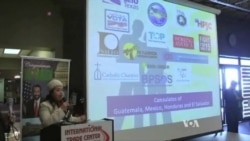From VOA Learning English, this is In The News.
President Barack Obama’s executive order on immigration was supposed to go into effect this week. The order would prevent millions of undocumented immigrants in the United States from being sent back to their home country.
But on Monday, a U.S. federal judge temporarily blocked Mr. Obama’s plan. Judge Andrew Hanen ruled in support of 26 states that sought to cancel the order. His ruling came a day before the first part of the program was to begin.
But experts say the legal battle is far from over.
Up to five million undocumented immigrants were excited when President Obama signed the order last year. In immigrant communities, feelings of hope turned to sadness when the judge’s ruling was announced.
At the White House, the president had this reaction.
“We are not going to disregard this federal court ruling. So we are not going to be, actually, taking applications in until this case is settled.”
A final decision on the case will take time. Paul Collins serves as Director of Legal Studies at the University of Massachusetts.
“And the law really is not black or white on this one. If it went to the Supreme Court and they ruled on the merits of this case, it probably wouldn’t come down for half a year to years.”
Until then, undocumented immigrants are unsure of their future.
The U.S. Congress has been unable to agree on a plan to reform the immigration system. Texas Congressman Lamar Smith is a member of the Republican Party. He says lack of congressional action is no reason for the executive order.
“The president said, ‘I am going to give them work permits. I’m going to allow them to stay, I am going to allow them to get federal benefits.’ That is where he went beyond what I think he can do.”
Some people have protested the judge’s ruling. But state officials who brought the case say they are defending constitutional order. Mark Brnovich is Arizona’s Attorney General.
“This is an important constitutional principle. This isn’t even just about immigration. It is about if the president of the U.S. can act unilaterally on any legal issue.”
President Obama disagrees.
“I think the law is on our side, and history is on our side. And we are going to appeal it. And we will be prepared to implement this (order) fully as soon as the legal issues get resolved.”
Until this week, history would seem to support Mr. Obama’s position. Legal expert Paul Collins says states have had trouble winning cases on immigration issues.
“The federal courts have been fairly deferential to the federal government’s policies on immigration, particularly when those challenges are being brought by states. So the states have a tough row to hoe (difficulty)."
The immediate issue for immigrants groups is persuading the undocumented to stay involved and not walk away from the public debate.
Idalis Cervantes lives in Arizona. Until Monday, she thought her Mexican-born parents would be protected from expulsion. She says she and her parents were heartbroken when they heard about the judge’s decision. Ms. Cervantes says she is not backing off.
“I will fight, and I know I have the whole community backing me up that will make sure my parents stay in this country.”
And that’s In The News from VOA Learning English. I’m Mario Ritter.
*This report was based on stories from VOA reporters Michael Bowman and Cindy Seine. George Grow wrote this story for VOA Learning English. Mario Ritter was the editor.
____________________________________________________________
Words in This Story
order – n., a command
immigrant(s) - n. a person who arrives in a country to live there
legal - adj., of or in agreement with the law
Congress - n., the organization of people elected to make the laws of the United States (the House of Representatives and the Senate)
What are your thoughts about immigration and foreign workers? Share them with us in the comments section.





